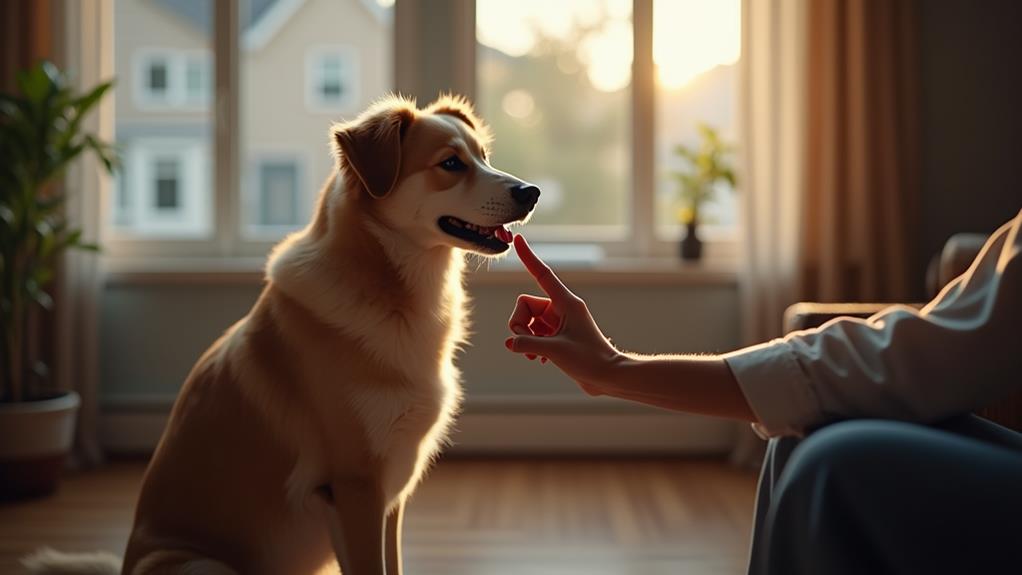To stop excessive dog barking, ensure your dog gets plenty of exercise through regular walks, runs, or playtime. Socialization is critical, so expose your pup to various people and pets to reduce anxiety-related barking.
Provide engaging toys and puzzles to keep their minds occupied when you’re away. Minimize visual triggers and offer a cozy retreat to create a calm environment.
Train your dog to respond to the “quiet” command, consistently rewarding silence. Remember, addressing the root cause of barking, whether boredom, fear, or attention-seeking behavior, is essential. With patience and the right approach, you’ll be on your way to a more peaceful home.
Points To Consider
- Exercise your dog regularly to release energy and reduce boredom-induced barking.
- Socialize your dog with people and pets to minimize anxiety-related barking.
- Provide engaging toys and puzzles to keep your dog mentally stimulated and less prone to bark.
- Create a calm environment by minimizing triggers and providing a comfortable space for your dog.
- Train the “quiet” command and consistently reinforce the desired behavior to manage excessive barking.
Exercise Your Dog Regularly

Release your dog’s energy through regular exercise to curb excessive barking. By providing your canine companion with consistent physical activity, you’ll tire them out, making them more likely to rest peacefully when you’re away. This simple strategy can significantly reduce problem barking and create a calmer home environment.
Incorporate outdoor adventures into your routine to combat boredom, a common trigger for excessive barking. Take your dog on daily walks, runs, or hikes to provide a constructive outlet for their energy.
Consider exploring dog sports like agility or flyball to mentally and physically challenge your pet.
If your schedule is hectic, don’t hesitate to hire a dog walker for mid-day exercise. This guarantees your dog receives necessary activity even when you’re busy.
During colder months, an indoor dog treadmill can be an excellent alternative to maintain your pet’s exercise routine.
Socialize With People and Pets
While exercise addresses your dog’s physical needs, socializing tackles their emotional well-being. Exposing your companion to various people and pets can significantly reduce barking tendencies. Creating positive experiences with diverse individuals, including mail carriers and delivery personnel, will help diminish your dog’s fear and anxiety in new situations.
Start socializing your puppy early to prevent excessive barking habits as it ages. Regularly introduce your dog to different environments and situations to build its confidence in social settings. This approach minimizes fear-based barking and helps your dog become more adaptable.
Consider these socialization strategies:
| Strategy | Benefits |
|---|---|
| Neighborhood walks | Exposure to various sights, sounds, and smells |
| Playdates | Interaction with other dogs in controlled settings |
| Group training classes | Structured socialization with people and pets |
Provide Engaging Toys and Puzzles

How can you keep your dog’s mind occupied and reduce excessive barking? The answer lies in providing engaging toys and puzzles that offer cognitive stimulation.
Interactive toys, especially those that dispense treats, can significantly decrease barking by keeping your canine companion mentally engaged and focused.
Puzzle toys that challenge your dog’s problem-solving skills entertain and stimulate cognitive function, helping to alleviate boredom-related barking.
Regularly rotating various toys will prevent your pet from losing interest and encourage continued play, effectively distracting them from potential barking triggers.
To maximize the benefits of engaging toys and puzzles:
- Choose interactive toys that dispense treats or require problem-solving
- Rotate toys frequently to maintain novelty and interest
- Use puzzles during times when you’re away to minimize anxiety-induced barking
Studies show that dogs with access to mentally stimulating toys exhibit calmer behavior and lower stress levels, reducing excessive barking.
Create a Calming Environment
Your dog’s environment plays an essential role in managing excessive barking. To create a calming atmosphere, start by introducing soothing sounds. Turn on a radio or TV at a low volume to provide familiar background noise to help your beloved companion feel more at ease when left alone.
Next, minimize visual triggers that might provoke barking—close blinds or curtains to reduce outside distractions, creating a more serene space for your dog.
Maintain a tidy and organized area to limit potential sources of anxiety and promote a sense of calm.
Establish a cozy retreat for your pet by providing comfortable bedding and favorite toys. This secure space will help your dog feel safe and relaxed, reducing the likelihood of stress-induced barking.
Train the Quiet Command

Training your dog to respond to the “quiet” command is essential in managing excessive barking. To teach this command effectively, wait for a moment of silence from your dog, then use a calm but firm voice to say “quiet” while immediately rewarding them with treats. Consistency is vital, so practice this command to reinforce the behavior in various situations.
When implementing the “quiet” command, remember these key points:
- Timing rewards: Offer treats immediately after your dog stops barking to create a clear connection between the command and their behavior.
- Avoid reinforcing barking: Don’t respond to your dog when they bark, as this can inadvertently encourage the behavior.
- Distraction training: Gradually increase the level of distraction during training sessions to help your dog remain quiet in stimulating environments.
Pair the “quiet” command with positive reinforcement to strengthen the association between the desired behavior and rewards.
As you progress, practice in different settings to help your dog understand when to be quiet. By consistently applying these techniques, you’ll help your canine companion develop better control over their barking habits, creating a more peaceful environment for both of you.
Frequently Asked Questions
How Do I Stop My Dog From Obsessively Barking?
Identify your dog’s barking triggers and address them through consistent training techniques. Use positive reinforcement to reward quiet behavior. Provide mental stimulation and exercise to reduce boredom-related barking. Stay patient and persistent in your approach.
How Do You Discipline a Dog to Stop Barking?
You shouldn’t “discipline” a dog to stop barking. Instead, use positive reinforcement and behavior modification techniques. Reward quiet behavior, ignore barking, and provide mental stimulation. Consistency and patience are crucial to changing your dog’s vocalization habits.
Why Does My Dog Bark So Much for No Reason?
Your dog’s “no reason” barking likely has triggers you’re missing. Dogs use barking as communication signals. Observe closely to identify what’s prompting the behavior. Once you understand the cause, you can address it effectively.
Can I Squirt My Dog With Water to Stop Barking?
While you can use a water spray for bark training, it’s not recommended. It’s a temporary fix that doesn’t address underlying issues. Instead, focus on positive reinforcement and redirection techniques to effectively manage your dog’s barking behavior in the long term.
The Article: Stop Excessive Dog Barking Was Found On https://happypetsgroomingtable.com/
The Article Stop Excessive Dog Barking First Appeared ON
: https://ad4sc.com



I completely resonate with your suggestions on managing excessive barking! Exercise has been a game-changer for my dog, Max. We started a routine of daily runs, and I noticed not just a decrease in barking, but an overall happier pup! I also found that engaging Max with puzzle toys helps keep him entertained when we’re away, which is vital for his mental stimulation.
It’s great to hear about your experience with Max! There’s really something special about seeing our pups thrive, isn’t there? Daily runs can do wonders; not only does it help with the barking, but it creates such a strong bond between you and Max. Plus, I think we often overlook just how much energy they have, and giving them an outlet for that can change everything.
You’re right about the bond that deepens through those daily runs. It’s become a ritual for both of us; a chance to clear our minds and connect. I never realized how much energy Max had until I started noticing the difference in his behavior after our runs. It’s like a light switch—calm and content at home after some exercise, versus the more restless and barky pup I used to deal with.
It’s cool to hear how those daily runs have become such an essential part of your routine. There’s something about getting that fresh air together, isn’t there? The way it shifts both your moods is fascinating. Dogs have this incredible way of letting us know what they need, and it sounds like you’ve tapped into that with Max.
I really appreciate your take on it. There’s something special about those daily runs that goes beyond just physical exercise. It’s almost meditative to be out in nature with Max, feeling the rhythm of our steps and the fresh air—it’s like a reset for both of us.
It’s amazing how those daily runs can transform not just our pups but our whole mindset too. I’ve found that when I take my dog out for that routine exercise, it’s not just about him burning off energy, but I end up clearing my own headspace. There’s something therapeutic about being in nature, even if it’s just a neighborhood loop.
You really hit the nail on the head with that observation. It’s awesome how daily runs create this ripple effect not only for our dogs but for ourselves too. When I take my dog out for a jog or just a long walk, it’s like we both hit the reset button. It’s funny how something as simple as moving our legs can shift our mental state.
I completely agree; there’s definitely something magical about watching our dogs thrive. Max has changed so much since I started taking him on those daily runs. Not only does it help with his barking, but it’s amazing to see how he becomes more relaxed and content afterward. It also really reinforces the bond between us. It feels like we’re part of a team on those runs, and I find myself looking forward to our time together just as much as he does.
I really enjoyed reading an article recently that dives into practical tips for managing barking, and it aligns perfectly with how beneficial those daily runs can be for Max.
‘Tips for Peaceful Pet Ownership: Stopping Dog Barking’
https://netootel.net/tips-for-peaceful-pet-ownership-stopping-dog-barking/.
I completely agree with you. It’s incredible how those daily runs have transformed our routine together. I’ve always known that exercise is important for both of us, but I was surprised at how much calmer Max has become. Reducing the barking has been a nice bonus, but it really is the bond that has grown that stands out the most.
I couldn’t agree more about the bond that develops through those daily runs. It’s like a rhythm we get into; the more we run, the more in sync we become. It’s fascinating how a simple activity like running can address so many aspects of our dogs’ well-being. I’ve definitely noticed that it has helped with Max’s barking and has made him much more relaxed overall.
I totally get that; creating those special moments with our pets is so fulfilling. Speaking of bonding, I recently came across some helpful tips on how to make traveling with them easier through pet-friendly car rentals.
‘Pet-Friendly Car Rentals: Simple Online Reservations Now Open’
https://netootel.net/pet-friendly-car-rentals-simple-online-reservations-now-open/.
It’s great to hear how well your routine with Max is working out. Daily runs can make a world of difference for a dog’s energy levels and overall mood. When you provide that physical outlet, it often translates into a quieter home, which is a win-win scenario.
It’s great to hear that exercise has made such a difference for Max! Daily runs can really do wonders for a dog’s energy levels and mood. Mixing in those puzzle toys is a clever move, too. Mental stimulation can be just as important as physical activity, especially when you’re away.
It’s great to hear that Max has turned into a furry marathon champion! Daily runs are like coffee for dogs—brewing up happiness one mile at a time. And I love the puzzle toys idea; it’s like a little game show for him when you’re away.
Your emphasis on addressing the root causes of excessive barking resonates deeply with my experiences as a dog owner. Engaging in regular exercise not only helps expend energy but also strengthens the bond between pet and owner. I’ve found that incorporating varied activities—like agility training or even exploring new parks—can be particularly effective in keeping my dog mentally engaged and less likely to bark excessively out of boredom.
I completely agree with you about the importance of addressing the root causes of excessive barking. It’s interesting how much our dogs mirror our own habits and routines. When I started incorporating regular exercise into my dog’s life, I noticed a significant change not just in his energy levels but also in his overall demeanor.
I completely agree with your perspective on addressing the root causes of excessive barking. It’s fascinating how much of a difference regular exercise can make. I’ve noticed similar results with my dog; when we dedicate time to explore different parks or try out new activities, his energy levels and excitement seem to shift so positively.
It’s great to hear about your experience! Regular exercise really does work wonders. When dogs get the chance to explore new environments, it not only tires them out physically but also mentally stimulates them. That shift in energy you noticed can really change their outlook and behavior. Have you found any particular activities or parks that your dog especially loves? I’m always curious to hear what kinds of adventures other dog owners are having.
I can really relate to what you said about engaging in regular exercise with your dog. It’s almost like unlocking a whole new level of the pet-owner relationship when you start mixing things up with activities like agility training and new park explorations. Dogs, like us, can get so much more out of experiences than just a routine walk around the block.
It’s interesting how much of a difference regular exercise can make for our dogs, isn’t it? I’ve noticed that, too—when I put in the effort to create those engaging activities, my dog seems much calmer and happier overall. Agility training is a great idea; I’ve read about how it not only helps with their physical fitness but also sharpens their problem-solving skills.
I’ve been reflecting on the importance of addressing underlying issues, and your point made me think of a recent read about stormwater drain challenges in Wollongong—definitely sheds light on the root causes that can lead to bigger problems down the line.
‘Stormwater Drain Solutions: Causes in Wollongong Explained’
https://netootel.net/stormwater-drain-solutions-causes-in-wollongong-explained/.